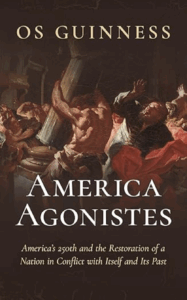Author’s Note: Os Guinness knows the history of revivals. He is an internationally respected author, social critic, and cultural analyst who has written or edited more than thirty books, including The Call, Time for Truth, and The Magna Carta of Humanity, and recently he released his latest book, America Agonistes: America’s 250th and the Restoration of a Nation in Conflict with Itself and Its Past. Educated at Oxford, where he completed his doctorate in the social sciences, he became an expert in sociology. Guinness has a respected voice like few others in the Evangelical world. He addresses audiences across the globe, from universities and think tanks to parliaments and business forums.
I recently completed an in-depth interview with Os for RENEW.org to gain his insight on this cultural moment. As a part of that larger interview, I asked Os about the future of America and the need for revival. (For Part 1 of this interview, “Os Guinness to Church Leaders on This Cultural Moment,” click here.)
To help properly set the stage for our discussion on Revival, I want to start with the part of my interview that focused on the challenge that our nation and Western Civilization as a whole is facing, what Guinness calls “this civilizational moment.”
HARRINGTON: In your book America Agonistes, you talk about the danger of turning to idols of power instead of the living God. What happens in the USA if there is not revival? What’s going to happen?
GUINNESS: Well, we’re at this civilizational moment. The West will go down the tube, pretty soon, unless there’s a profound renewal. And so will America. The American Republic is on its last legs.
“We’re at this civilizational moment. The West will go down the tube, pretty soon, unless there’s a profound renewal.”

HARRINGTON: Wow! What would that look like, the collapse of American freedom?
GUINNESS: It’s not jackboots marching through the cities. It would be more of a super-engineered, technological-linked utopia. We’d all be following the dictates and voting the dictates of whoever’s running the grand machine. People think we’re now facing three great ideologies: communism, fascism, and Nazism. And people think that’s it. I would say, no, we could be on the verge of a new super-ideology—made super dangerous by AI. It could be a kind of super-gnosis, a super-wisdom, a super-mind … this could be the world of the future. For the moment, totalitarianism, which claims to control everything, has a hard job, because it can’t get into people’s thinking. But with all the new technology, we’re in a much more dangerous area. We could be in a very extraordinary world to come—unless Christians stand against it. We are the people of freedom. We are the people who know the danger of power. We need to remember the last words of Friedrich Nietzsche.
HARRINGTON: What are they?
GUINNESS: Nietzsche calls for a revaluation of all values. The Christian view he calls slave morality—for the weak, the meek, the humble. His final book, which came out twenty or so years after he died, was called The Will to Power. In the very last paragraph, he asks, “Do you want a name for this world? . . . This world is the will to power—and nothing besides. And you yourselves are this will to power—and nothing besides!” In other words, unprincipled, unbridled power.
HARRINGTON: Wow.
“We are the people of freedom. We are the people who know the danger of power.”
GUINNESS: Might makes right. That is the danger of Xi Jinping and the left wing in our liberal democracies in the West. We stand against that. You know, the whole notion of checks and balances, because humans will abuse power. We Christians have the key, the notion of human dignity, the notion of freedom, the notion of the need to separate power from power. We have the key to the only counter to a totalitarian future. That’s the good news.
HARRINGTON: That’s the good news, and it’s one of the things that should help motivate us to be about the mission Jesus left us with, which is to be disciples and make disciples…
GUINNESS: Absolutely. And be about this revival you and I have been talking about.
HARRINGTON: What I hear you saying is that, if America does not see revival, it’ll resort to some version of democracy that becomes totalitarianism by another name. Is that correct?
GUINNESS: Yeah. A long time ago, the great Catholic historian Christopher Dawson described countries like Russia with an autocratic background, or Germany with a military background, as having what he called “harsh totalitarianism.” But countries like England and America, with their much more freedom-loving background, would be in danger of having what he called “soft totalitarianism,” where society would be ruled by the state, and the state by the party, and all would be manipulated in a smooth way. And that’s where we’re going with much of the talk of the left.
“We Christians have the key, the notion of human dignity, the notion of freedom, the notion of the need to separate power from power.”
So, the left attacks Donald Trump for being a dictator. And he’s done some things, I think, unwisely. But, having said that, I believe the real danger is from the left: an authoritarian state. Not simply an authoritarian personality. I mean, Trump, for better or worse, even if you hate him, he won’t be around. He has to leave anyway in four years’ time, he’s almost my age, and he’s not going to be there when you guys are approaching his age. So, the danger is not Donald Trump. The danger is the autocratic, authoritarian state. And the left is pushing for that.
HARRINGTON: And what you’re saying is that coupled with AI, apart from a revival of faith in Jesus, that’s what we’re facing, correct?
GUINNESS: Yeah. And we’ve got to be faithful. Whether there’s a revival, and millions turn to the Lord, or whether there’s, you know, ten of you left in some awful day in the future, we’ve got to be faithful. And say things do get worse, and there’s a crisis. The danger for the church will be when dangerous ideas, conspiracy theories, and so on flourish, and Christians think, as zealots do, that they ought to take the law into their own hands. That’s very dangerous. We do not want any violence from the Christian side.
HARRINGTON: Yes, that’s correct. Now, you are a European, you’ve spent a lot of time there, and back in the day, I believe you spent time with Francis Schaeffer in Switzerland. What happens to Europe if the United States becomes more totalitarian, even in its soft version?
“Whether there’s a revival, and millions turn to the Lord, or whether there’s, you know, ten of you left in some awful day in the future, we’ve got to be faithful.”
GUINNESS: Well, Europe’s going downhill faster than ever. I’ve always thought as an Anglo-Irishman that the Lord was gracious to England, because it had done so much for the gospel in the past. Now, the last twenty years, England has gone downhill with incredible rapidity, for example, with secular degeneration. My own country is Ireland, as you can tell from my name. We were always evangelicals, the Guinness family, amidst a very Catholic country. As Ireland’s degenerated, it has the most rapid secularization in history.
HARRINGTON: That is not good.
GUINNESS: And along with that, the most vicious anti-Semitism. I’m just so ashamed and appalled by many of my fellow Irishmen, who are in the lead of the worst anti-Semitism. So, Europe as a whole is degenerating—far faster than the U.S. You know, I wish Mr. Trump and Mr. Vance would not just hammer the Europeans for this and that, but call them back to their greatness.
HARRINGTON: Yeah, call the people of Ireland and Scotland and Britain back to their roots.
Guinness: In the ways of Christianity. We can’t have Christians retreating into the purely spiritual, the purely religious, and things like that that many are doing. No, the lordship of Christ has got to bring us out into the whole of life.
HARRINGTON: Yes.
GUINNESS: Because we are the only salt and light today that can be a counter. There are incredibly sobering menaces on the horizon. But we’re not flummoxed by any of them. The Lord is greater than all. He can be trusted in every situation. We must have faith in Him, have no fear, and move out following Him, and let ourselves, by God’s grace, become the answer.
“There are incredibly sobering menaces on the horizon. But we’re not flummoxed by any of them.”
HARRINGTON: In this world, Jesus said, you will have trouble.
GUINNESS: But take heart, I’ve overcome the world. That’s right.
HARRINGTON: And so, we have this hope within ourselves: the hope of the gospel, the hope of the promises of God. And no matter what happens, He’s with us.
GUINNESS: Yes. But the trouble is, Bobby, some Christians have concluded that we are to be a shivering, sheltering little minority that’s hiding. You know, salt and light means we’re maybe small, we may be a few—but we’re a creative minority. In the growth of civilization, as well as in the time of renewal or decline, the key thing, is there a creative minority?
HARRINGTON: We are going to be faithful disciples who make disciples and who believe in the hope that Jesus is coming back for us. We believe in His kingdom and that His ways are the best ways. God is kind and good, and His ways are kind and good. So, we pray for revival.
GUINNESS: We are steely-eyed realists, loyal to King Jesus.
HARRINGTON: We are those who proclaim his kingdom and his ways publicly and privately, with boldness, courage, and confidence.
GUINNESS: Well said. Amen.
HARRINGTON: My biggest hope right now is based upon what I am seeing with Gen Z and younger Christians, those who are sold out for Jesus. The Great Revival, so many called it, was often associated with the Methodist revivals in England that began in the 1730s–1740s, sometimes dated around 1739 when open-air preaching and mass conversions really took hold in the USA. Here’s how the ages worked out in 1739:
- George Whitefield – 24 years old
- John Wesley – 35 years old
- Charles Wesley – 31 years old
May we pray for revival and support all young leaders who step forward when it starts!
GUINNESS: Yes.
“We are steely-eyed realists, loyal to King Jesus.”
HARRINGTON: So, let’s talk about renewal and revival. You have the advantage and the wisdom to guide us when it comes to understanding revival movements in history. I have personally been saying for several years that we want to be that faithful remnant, while we’re praying for revival. I think an honest observer will say, especially with young men, that there are some signs of revival today—some of the things Charlie Kirk was doing, some of the things I’m seeing on college campuses. I was talking with a young man just earlier today who’s involved in a disciple making movement in a West Coast university, where there are 1,500 students coming together. We are seeing mass baptisms on college campuses.…I’m hearing from Barna Research that there’s an uptick, especially with Gen Z, in church attendance, especially with young men coming back to church. Are we seeing revival? And how do we know when revival is, in fact, coming to us?
GUINNESS: Well, I’m encouraged by, say, young people coming back to faith, even in countries like Britain, and most surprisingly, France, which is so skeptical and secular. So, there are trends. But I’d tell people to be very wary of just looking at it sociologically. Too many people are looking at renewal here, resurgence there, and pronouncing revival. I’m a believer that we should be looking, for example, at the first or second awakening.
HARRINGTON: So, you are seeing some good trends?
GUINNESS: Look for the preaching of the Word in power and conviction, for repentance, and for an outpouring of the Spirit in power. They were a work from the Lord and from heaven.
“Look for the preaching of the Word in power and conviction, for repentance, and for an outpouring of the Spirit in power.”
I was listening before we were on the call today to a Christian leader whom I’m a friend of, saying we’re seeing revival. But no, I don’t think we are. We’ve seen local revivals, say the Asbury experience two years ago, and so on…but that was local.
When you look at the great revivals, they sweep countries, and now in the global era we need to sweep the world. And the Lord can easily do that, and that’s what we should be praying for, I think. But we mustn’t pronounce any revival yet. You know, I remember in the 80s when I came to Washington, there was a lot of talk about boomers turning to God and revival. Well, it was a renewal, because boomers wanted faith to teach their children. It was a resurgence, it was a renewal at a human level, but it wasn’t revival. There are churches, for example, in the South, who have a week-long campaign and call it a revival, but that’s not revival.
HARRINGTON: So, what do we look for at a deeper level?
GUINNESS: You know, I come from the Guinness family. Many people don’t realize my ancestor, Arthur Guinness, whose signature is on the beer bottle, came to faith through John Wesley. His grandson, my great-grandfather, was in the Irish Revival of 1859. He was 23, and he would mount on the back of a carriage and speak, and there were crowds of 25,000-30,000 people. And the Spirit would fall. And in that part of Ireland, about a quarter of Ireland, for the next year after the revival of 1859, there was only one recorded crime.
HARRINGTON: Wow, I pray for that to happen again!
“There are churches, for example, in the South, who have a week-long campaign and call it a revival, but that’s not revival.”
GUINNESS: Millions of pounds’ worth of stuff that had been stolen from businesses was returned. In other words, the revival was very profound. It was a conviction of the Word and of sin and an outpouring of the Holy Spirit. So, while we pray for revival, let’s reserve the word for the full meaning. All we contribute to revival is need and prayer. We are looking to the Lord.
HARRINGTON: In your experience, and in your study of history, is there a clear connection between prayer movements and revival itself?
GUINNESS: Absolutely. That is always the beginning: a level of need that drives a few people. You take revival in New England, where people had been just praying in a haystack. And the Irish Revival started in a little town called Kells, where it was just a handful—I think it was four people; that’s all. And they prayed so urgently that the Spirit fell in power. That’s what we need. So, let’s not just baptize any renewal, or resurgence, or whatever. I was listening this afternoon to a friend who said that Charlie Kirk’s memorial has set off revival. I thank God for the witness in what happened, especially through his wife, Erika. Wonderful, but I don’t think that’s what we should call a revival. A renewal, maybe.
HARRINGTON: So, how will we know when we’re witnessing a revival? What does it look like?
GUINNESS: Well, the first thing you see very clearly is the Spirit falls, and there is a massive, powerful conviction of sin. We’re not quite broadly seeing that yet today.
HARRINGTON: Does that conviction about sin have a connection to the Word?
“It was a conviction of the Word and of sin and an outpouring of the Holy Spirit.”
GUINNESS: Oh, absolutely! It is the preaching of the Word. You take Jonathan Edwards, or John Wesley in the mid-1700s, through whom my ancestor came to faith, or George Whitefield, who in many ways was behind the American Revolution. No one else had traveled from the North to the South and preached almost everywhere, except George Whitefield. And he was mighty in preaching the Word and the conviction of sin that followed.
HARRINGTON: Okay, so there’s a lot of exposure to the Word, which causes conviction, massive conviction of sin, which leads to repentance. And at the heart of revival is repentance. Am I getting that right?
GUINNESS: Absolutely. You know, we all know the Greek word for repentance, metanoia, and it means that radical about-turn of heart and mind and spirit. It’s a very radical word. The Hebrew word for repentance, teshuvah, runs even deeper. Yes, it means the radical about-turn of heart and mind and spirit, but it also means homecoming—coming back to the truth, back to the Lord, back home.
GUINNESS: It’s the prodigal son. When he came to himself, then he headed home. And America has the word “homecoming,” you know, going back to your alma mater and watching a football game or whatever. The biblical idea of homecoming is much more radical than that. We need to pray for an American “homecoming,” national repentance and revival.
“It means the radical about-turn of heart and mind and spirit, but it also means homecoming—coming back to the truth, back to the Lord, back home.”
HARRINGTON: I’m good friends with Robert Coleman, who wrote the book The Master Plan of Evangelism, which to us is the gold standard when it comes to Jesus-style disciple making. He was a part of the Asbury revival of 1970. He said there are a lot of things to note about that localized revival, but most importantly he said everybody just wanted 1) to confess their sins and 2) tell you how much they loved you. That must have been a cool thing.
GUINNESS: Wonderful. My father was a witness to the Hebridean Revival and Donald Campbell in the 1950s. It was deep and profound, but it was largely local. We need to so pray for something that is a movement across the whole country.
HARRINGTON: So, a true revival is much bigger than Asbury in 1970 or other localized experiences. Let’s all be praying for a true, broad revival. Here is my own conviction. I believe that at the heart of revival, when it comes, will be disciple making. I think there’ll be a correlation of disciple making, where everyday people are engaged in God’s Word, with Holy Spirit conviction, with, as in Asbury, a sharing of loving relationships. Furthermore, there will be a correlation between revival and a revival of everyday people being disciples who are making disciples and spreading the flame. Is there anything in history that would lead us to think that that might be possible?
GUINNESS: Of course: the Reformation. For a long time, the Catholic Church had put its emphasis on monks and monasteries. And they were very, very powerful in their way. But then Martin Luther, and in particular John Calvin, recovered the notion of calling everyone, everywhere, in everything.
“We need to so pray for something that is a movement across the whole country.”
HARRINGTON: That is it. Disciple making, more than any other emphasis in the church, will bring empowerment so that it is, as you say, 1) everyone, 2) everywhere, and 3) in everything! That is a disciple making movement!
GUINNESS: It will be a following out of the will of Christ as disciples. That is what many people say made the modern world. The notion of calling—it was dynamic and pervasive.
HARRINGTON: When revival comes, is it often led by younger leaders? You mentioned one of your relatives; I think you said he was 23. Is it typical that it’s younger people who lead revival movements?
GUINNESS: Usually. Wesley? Whitefield? Edwards? They were all young at the height of the revival, you know? But, then, old men—I’m in my 80s—you think of dear old Caleb. You look at Moses, whose eye was not dimmed at 120.
HARRINGTON: I love it. Well, even though I’m in my 60s, we’re both going to sign up to be anything the Lord wants.
GUINNESS: Absolutely. Absolutely, Bobby.
HARRINGTON: You can count the two of us—we are in—and I know many more will join us. We must.












